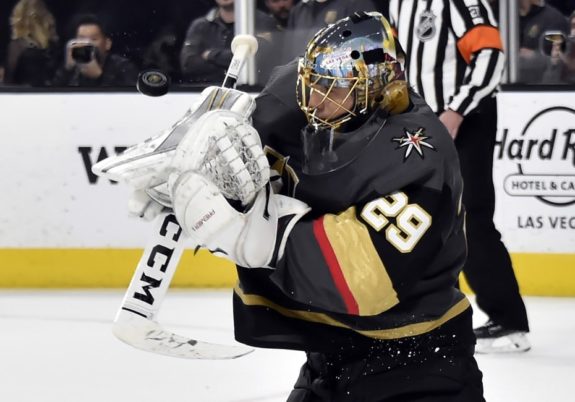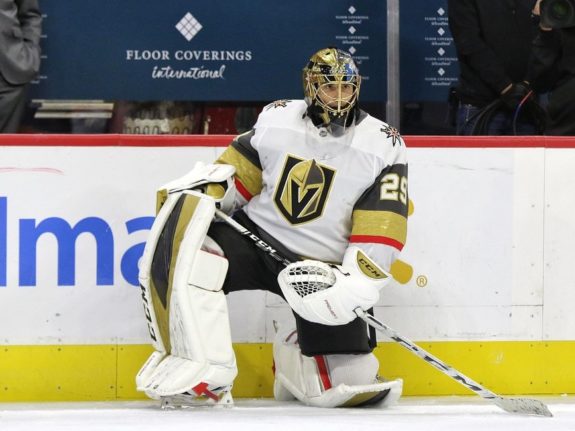35 years old is “old” for a professional athlete in 2020, and it is especially old for a hockey player. For a goalie? it’s archaic. At that juncture of your career, you’re likely a backup in the NHL, that is if you’re even sharp enough to still be there. However, if you’re a generational three-time Stanley Cup champion, there are exceptions – that exception is Marc-Andre Fleury.
Unfortunate Circumstances
It’s no secret Fleury has been dealt the short end of the stick in recent years. Between the Pittsburgh Penguins favoring the then-rookie Matt Murray over him in several Cup runs, to being handed over to the Vegas Golden Knights in the 2017 Expansion Draft after 13 brilliant seasons, and now, losing the crease to Robin Lehner last postseason, who signed a five-year, $25 million contract this offseason.

None of these happenings have ever been due to dwindling play by the four-time All-Star – it’s been simply due to unluckiness. In 2016, it was a concussion that kept him out, allowing the sparking AHL talent in Murray to seize the crease. This past season? A five-month hiatus after Lehner was just acquired at the trade deadline and making a favorable impression with three wins in his only three regular-season starts as a Knight.
Stiff Competition
Fleury started four games to Lehner’s 16 in the summer postseason bubble. Head coach Peter DeBoer favored the latter from the start as Fleury was used as an alternate in back-to-back contests. He posted admirable numbers too—going 3-1 while surrendering nine goals and sporting a .910 save percentage in that span. Lehner, however, never faltered either in his campaign, leading the Knights to the Conference Final.
It’s part of what makes goaltending such a difficult position for the psyche. Even when stellar play is showcased in limited opportunity, sometimes it pushes the other guy to be even better—limiting your opportunities even more. And at this juncture in Fleury’s career, it is wasting what brilliant goaltending is left in the tank.

The Knights’ elimination was no fault of the netminding either, as the offense was in their own heads against the Dallas Stars after Vancouver Cancucks backup Thatcher Demko was a nightmare in the Conference Semifinals – allowing only two goals on 130 shots in his four games. Lehner was up to the challenge, stopping the limited opportunities against a less experienced Vancouver offense. But ultimately, Dallas wouldn’t let the same opportunity slip in the infertile Knights scoring.
What is Ahead?
The door is wide open for Lehner to retain the majority share of starts in this upcoming shortened season, which spells danger for Fleury’s starter days officially coming to a close barring anything unforeseen. The former first overall pick has two years left on his contract, and he plans to accept the No. 2 role. The trade negotiation window is still open for general manager Kelly McCrimmon to strike a deal for his valuable backup, but it’s looking more and more difficult.
With the Lehner re-signing and offseason Alex Pietrangelo acquisition, the cap space is as tight as a drum these days, and $7 million AAV for bench heat is just plain profligate. It’s crazy that franchises are playing hot potato with a future Hall-of-Famer, but circumstances have caused him to be the odd-man out despite being both the Penguins’ and Knights’ best goalie in franchise history, respectively.
I understand the contract is a lot to eat for a guy on his way out, but it’s clear he is still a No. 1 caliber goaltender in the NHL. There are several goalie-deficient teams that could use him; it’s just about landing the right deal. With his resume, loyalty and leadership, I think he deserves a chance – whether that be the first nod in Vegas or elsewhere in the league. Yes, today’s NHL is certainly starting to evolve into a tag-team goalie approach, so Vegas is set for dominance there, but in the grand scheme, there’s no evidence of regression for No. 29 to be wearing a baseball cap.